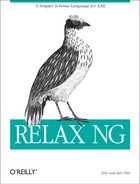Name
oneOrMore —
oneOrMore pattern
Synopsis
element oneOrMore
{
(
attribute ns { text }?,
attribute datatypeLibrary { xsd:anyURI }?,
attribute * - (rng:* | local:*) { text }*
),
(
( element * - rng:* { ... }* )
& (
element element { ... }
| element attribute { ... }
| element group { ... }
| element interleave { ... }
| element choice { ... }
| element optional { ... }
| element zeroOrMore { ... }
| element oneOrMore { ... }
| element list { ... }
| element mixed { ... }
| element ref { ... }
| element parentRef { ... }
| element empty { ... }
| element text { ... }
| element value { ... }
| element data { ... }
| element notAllowed { ... }
| element externalRef { ... }
| element grammar { ... }
)+
)
}May be included in
attribute, choice,
define, element,
except, group,
interleave, list,
mixed, oneOrMore,
optional, start,
zeroOrMore
Description
The oneOrMore pattern specifies that its
subpatterns considered as an ordered group must be matched one or
more times.
..................Content has been hidden....................
You can't read the all page of ebook, please click here login for view all page.
